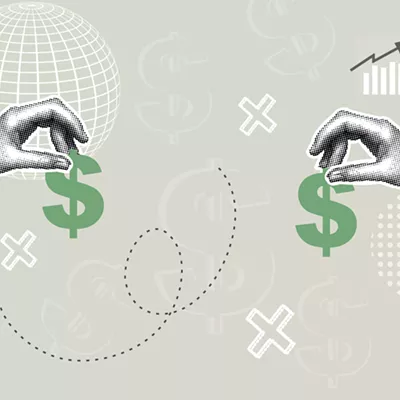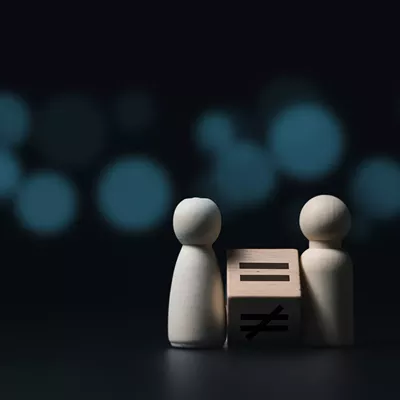This is advice I'm leaning heavily into these days (takes deep breath). It seems like any conversation is just one or two sentences away from ending up in an argument. One wrong turn into the topic of politics and all too often we walk away feeling that our friend, colleague or family member is ignorant or even hateful about a topic we feel strongly about. This happened to me at a family dinner recently. An aunt shared her thoughts about a recent shooting and the need for gun control, and a cousin responded in defense of the second amendment. Things quickly escalated into name-calling and judgment.
To be clear, the fear and anger we feel when someone threatens our very existence is justified. There are active attempts to roll back women's rights, minority rights, health care access and more. While we're right to advocate for our beliefs, we will likely find that the majority of people in our lives are moderate – dare I say normal – people who are also merely trying to navigate these challenging times. While it's temping to leave an emotionally charged conversation by putting someone in their place and stomping away high on indignation and moral righteousness by calling them an idiot or worse, the fact is that doing so closes the doorway to communication. We miss opportunities to see issues from the other person's perspective, and we end up increasingly isolated and frustrated.
In important conversations, avoiding an emotional reaction or judgment will improve our critical thinking skills and allow us to approach problems rationally, make more informed decisions and foster creative solutions. So, because it's one of the ways I'm coping in today's polarized and tense world, I'm sharing a few ways that help me understand difficult topics and challenging (sometimes even infuriating) opinions. I hope it helps you, too.
Understand common types of bias
Bias actually helps our mind be more efficient, but left unchecked, biases can limit our thinking and result in our thoughts and actions becoming more polarized. Bias is like an algorithm for our brain and comes in many different forms. Recognizing different forms of bias helps to break the pattern. Some common types of bias that affect our thinking include:
Confirmation bias: Humans seek out information that confirms our existing beliefs while tending to ignore contradictory evidence. Both social and traditional media lock us into confirmation bias by showing us more and more of the things we like, follow and subscribe to. Once we're locked in, an algorithm presents us with similar content which reaffirms our beliefs. Instead of going with the flow, seek out conflicting information; search for contradictory evidence or opposing sources to challenge your thinking and break the algorithm.
Anchoring bias: This bias causes us to rely too heavily on the first piece of information encountered about a topic, even if it's not fully accurate. It's like a first impression bias that causes us to have a difficult time unhearing or unseeing a shocking headline once it has entered our brain. Again, do a little research and consider whether the opposite might be true.
Availability heuristic: We tend to overestimate the importance of information that is easily accessible or recent, often resulting in skewed conclusions. Humans tend to overestimate the likelihood of tragic events such as plane crashes – because examples of them are newsworthy and memorable – while underestimating our chances of more common events such as automobile fender benders – which happen more often but are less newsworthy. Because something controversial happened once, it can be tempting to feel that such controversies are all around us, even when they are rare.
These biases are just some of the biases in our thinking. But because they operate unconsciously, they are challenging to overcome. By identifying and understanding bias, we can begin to spot these dysfunctional patterns in our thinking.
Foster open-minded thinking
Did you know that open-minded people tend to be happier? A world full of possibilities is a happier place than a world where we feel others are hateful, out to get us or going crazy. Take the time to understand another person's reasons for feeling differently about a topic than you do, and you'll feel less resentment, fear and anger.
Play devil's advocate: When confronted with a difficult topic (let's say gun control or abortion rights), ask yourself: What reasons would lead a rational person to believe what this person believes? Considering the situation from another person's perspective encourages us to look at the problem from multiple angles, helps uncover potential pitfalls in our own thinking and prevents us from disregarding other people's opinions as hateful or ignorant.
Question assumptions: Ask yourself questions such as, "What assumptions am I making about this topic or person?" or "Is there evidence that contradicts my conclusion?" Doing so can prevent blind spots and encourage deeper analysis.
In our rapidly changing and tense world, critical thinking is a requirement. By understanding common biases and fostering more open-minded and reflective thinking, we can better understand our own beliefs, find common ground with people we care about and maintain the inner calm that is going to be needed in the times ahead. Like a jiujitsu warrior who keeps his emotions in check, we'll feel more resilient and better poised to tackle complex challenges with clarity and confidence.











